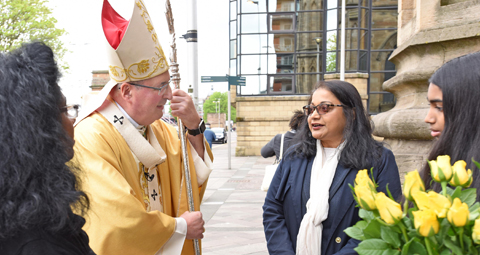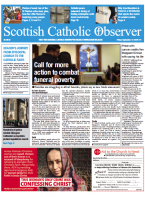BY No Author | May 2 2019 | ![]() 0 COMMENTS
0 COMMENTS ![]() print
print

Hurt and anger in Scotland’s Sri Lankan community as fear prevents Sunday Masses in Colombo
Publication Date: 2019-05-02
Scotland-based Sri Lankans speak about their loss and express frustration at how authorities missed warnings of deadly Easter Sunday attacks - By Ryan McDougall and Peter Diamond
Scotland’s Sri Lankan community has condemned the county’s government for not preventing the Easter Sunday terror attacks in Colombo, as Scottish Muslims and Catholics came together to pay respects to the victims of the tragedy.
Rohan Fernando, a father-of-three and parishioner at St Joseph’s Church in Dundee, lost four members of his family in the April 21 attacks on churches and hotels that killed more than 250 people.
Mr Fernando, 44, said: “The government could have done more to prevent the attack from happening.
“Reports are suggesting that information about a planned attack was given to the government and then passed onto the hierarchy but no response was distributed.”
Upcoming elections
Mr Fernando also believes upcoming elections this year means government condemnation of the attack hasn’t been robust enough, as the administration is targeting the Muslim vote, a growing part of the electorate.
Sunday Masses are currently suspended in the country, but Mr Fernando believes people will still avoid churches due to the current fear gripping Catholics.
“All the churches have been shut out of fear for the time being and Mass was broadcast on television for Catholics from the bishop’s residence.
“Families were huddled kneeling around their TVs at the weekend. That is how unsafe our home currently is.
“There will be people too afraid to stand inside and will be congregating outside of the church,” he said.
“Every night in our own home since the attack we have been saying prayers together as a family for our loved ones affected by the blast.
“My relative who lost her husband has told me she feels like she is living as a dead person—but there are also suggestions that people’s Faith has become stronger and will be even more dependent on Jesus Christ going forward.”
Intelligence failures
The Sri Lankan Association in Scotland (SLAS) is an organisation of people who have emigrated from Sri Lanka, or have Sri Lankan heritage.
Chairperson Dhammika Siripala this week criticised the government of Sri Lanka for not acting upon intelligence that attacks were imminent.
Mr Siripala said the country’s current government has ‘no idea about how the country should be run’ in the peace era following the end of the Sri Lankan Civil War and that they did not react quickly enough to information warning of possible terror attacks.
“The government had to react fast, not take days or weeks or months,” Mr Siripala, who has lived in Scotland for 16 years, said.
“The country has seen enough terrorism—how we see it from outside of Sri Lanka is that they still need to do more.
“The country is paralysed at the moment. It isn’t functioning and schools are shut down.”
A country of peace
Mr Siripala said that despite the horror, Sri Lanka is still a country of tolerance where people of all faiths live peacefully.
“I don’t think there’s a better example in the world of such diversity and harmony. Christians, Catholics, Muslims and Buddhists, you name it—Sri Lanka has it.”
Solidarity
On Sunday, Archbishop Philip Tartaglia of Glasgow celebrated a Mass in St Andrew’s Cathedral for the attack victims.
Anjali Desilva, a Catholic Sri Lankan woman living in Scotland, attended the Mass.
She said she fears the 10 years of peace in her home country has been ‘shattered’ and criticised the Sri Lankan government.
“I blame it on the government because they did have the intelligence, so they could have done something to prevent or at least minimise casualties. But what can we do now? We can try and protect our people in the future,” she said.
Cardinal Ranjith
This week, Sri Lankan Cardinal Malcolm Ranjith said the Sri Lankan government failed to heed warnings about the attacks, claiming he would have cancelled all Holy Week services had he been told.
In 2019 there have been several major attacks on Christians by extremist groups. In March, Islamist Fulani extremists in Nigeria attacked Christian villagers that left more than 130 dead.
Prayers from Glasgow
Speaking at the Mass for Sri Lankan victims, Archbishop Tartaglia said Catholics of Glasgow Archdiocese offered their ‘deepest sympathies’ to Sri Lankan Catholics, Christians and nationals present.
He read out a letter of solidarity from the Ahmidiyya Muslim Community Glasgow (AMCG) to a round of applause from the congregation. The letter described the attack as ‘horrific’ and said the ‘true teachings of Islam never condones such actions.’
AMCG representatives also gifted flowers in solidarity with the city’s Catholics, which were displayed near the altar of the cathedral.
Building bridges
Ahmed Owusu-Konadu, external affairs secretary for the AMCG, was among those present at the Mass.
He called on Christians and Muslims at a local level to build bridges with one another through dialogue and interaction, and added that faith leaders can inspire a change in attitude.
Citing Pope Francis’ recent visit to the UAE as an example, he said: “The Pope going to the United Arab Emirates was a good initiative.
“When the leaderships come together the congregation will listen normally and follow suit.”
Scots in Sri Lanka
Meanwhile, two Scottish Catholics who were in Sri Lanka when the attacks took place are grateful to have escaped the bombings.
Husband and wife Louisa and Richard King, parishioners of the Immaculate Conception Church in Maryhill, shared their experience of the terror attack.
“We had stayed at the Shangri-La hotel for a couple of days during the previous week so it was frightening to think that, had the attacks taken place earlier, we might have been caught up in the devastation,” Mrs King said.
“We attended Mass at 8am on Easter Sunday and there were armed policemen outside the church.
“We both wondered why that was necessary—it was only when we returned to our hotel that we found out about the attacks on other churches.”
Mrs King said the terrorists are ‘in no way representative of the Muslim community’ and that many Muslim communities hung black and white flags in mourning with the victims in the days that followed.










